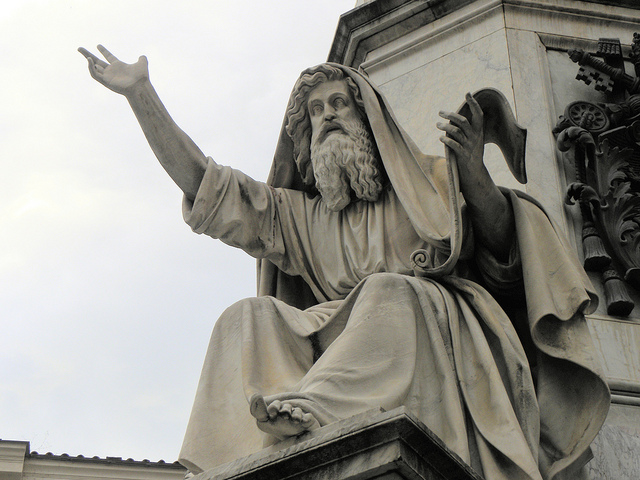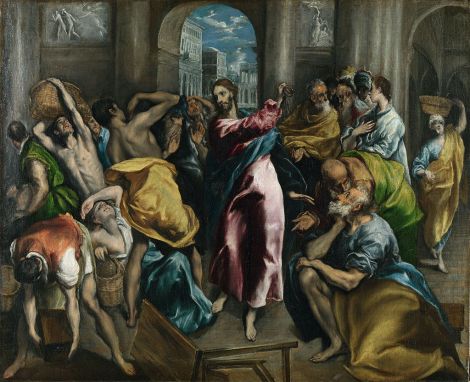The prophets of Israel were activists. They did not reveal much that was new. Their calling was to hold a mirror to society, mostly to the ruling elite, and show them how far they had drifted away from the essence of the covenant faith.

In calling Jeremiah and Ezekiel, God was making a statement. Both were priests. They knew the law. They administered it. He did not call them to add to it, nor to detract from it. He simply set them up to be watchmen for the people. [1]Ezekiel 3:17-21
If prophets weren’t called to give new revelations why did Israel need them? After all Moses had told them the word of God was not in heaven, so they did not require anyone with a special anointing to bring it down. Neither was it beyond the horizon. He said:
“But the word is very nigh unto thee, in thy mouth, and in thy heart, that thou mayest do it.” [2]Deuteronomy 30:11-14
In spite of having the ‘word in their heart’, a time came nonetheless for God to begin a phase of social conscientisation. [3]2Chronicles 28:8-15
You can’t buy God. You must return to the principles of the covenant faith. You must do well.
Although Leviticus is largely a priestly code, chapter 19 couldn’t do more to present God as a socially conscious God. A God who cares about how we relate to him and to one another.
So whenever the people of Israel reduced the covenant faith to a sacrificial code, Isaiah, [4]Isaiah 1:11-17 Jeremiah, [5]Jeremiah 7:9-12 Amos, [6]Amos 4:1-7 Micah, [7]Micah 6:6-8 and other prophets reminded them that they couldn’t buy God with the blood of rams. You must return to the principles of the covenant faith. You must do well.
It therefore troubles me when some in the church of God in Christ Jesus say that the ministry of the prophet is no longer required.
They say the church has matured [8]http://carm.org/question-modern-prophets and the holy spirit is a constant guide. Others say canon is closed and that Christ is the final revelation and his teachings obviates the need for further revelation. Others say the ministry of the prophets was a so-called ‘Old Covenant’ phenomenon. [9]http://www.ukapologetics.net/prophets.htm Such ignore the fact that Jeremiah was made a prophet to the nations, [10]Jeremiah 1:5 not just to people signed up to the Sinaitic covenant. And Jonah was sent to the people of Nineveh, a nation that was enemy to the people of the covenant.
Such views take a rather narrow approach to the function of the prophetic ministry, as the modern church often does of ecclesiology. We gather all sorts bind them together, dump them on the holy spirit and carry on as though all were perfect.
The lack of a robust prophetic anointing in the church should be a cause for concern.
Scripture did not give us any reason to saddle on the holy spirit much of what we lump on it.
The early church had prophets and the anointing is acknowledged in St Paul’s inventory of the offices within the church. The brief entry on Agabus in Acts of the Apostles showed that the spirit of the prophet in the early church is different from what goes for ‘prophesying’ in churches today. It wasn’t about positive confessions and pronouncements.
Should the lack of a robust prophetic anointing in the church be a cause for concern? You bet.
Deuteronomistic historians in the books of 1Samuel to 2Kings presented the history of ancient Israel to teach lessons.
From the fall of Eli and Saul, the high crimes of Ahab and Manasseh, to the misdemeanour of David and Solomon, we learn that when we honour the terms of our covenants with God, all will be well, but when we ignore the principles of those covenants, bad stuff happen.
There was nothing in such an approach to telling stories to cause us to think the Almighty himself did not dictate them. They are sobering, edifying and a blessing to those who desire soul elevation.
The story of Ahab and Jezebel are a cult classic. It comes packed with all modes con: idolatry, greed, covetousness, murder, and a large dollop of religious syncretism. Elijah pronounced the judgement of God on them. Jehu was anointed to execute that judgement. [11]2Kings 9:2-10
The church that seemed most ‘successful’ and ‘blessed’ was the most spiritually failed and impoverished.
Jehu went about his assignment with the zeal of a butcher in an abattoir. We are told that he was so committed that he left God breathless. The Deuteronomistic historians wrote that God was so pleased he blessed Jehu to the fourth generation. [12]2Kings 10:30
That’s just the beginning of the story.
100 years later the spirit of the Lord threw Hosea into the fray. God promised divine vengeance on the house of Jehu for the same reason that the Deuteronomistic historians wrote that God blessed him. [13]Hosea 1:4
Lesson: A bit of a higher historical criticism can be a healthy spiritual meal. God used the prophets to serve up such meals.
Some might say since we have the holy spirit leading us into all spiritual truths, why would God need extra hands in the broth?
Let’s take a case study.
St Paul wrote:
“For by grace are ye saved through faith; and that not of yourselves: it is the gift of God: Not of works, lest any man should boast.” [14]Ephesians 2:8-9
St James wrote:
“Even so faith, if it hath not works, is dead, being alone.” [15]James 2:17
What is needed here? A higher epistolary criticism – the prophetic imperative.
If ever a running commentary, a here-and-now divine intervention in the affairs of the church, was necessary, the apocalyptic end to the Christian Bible makes a case for it.
The book of Revelation details God’s messages to seven churches. Of the Seven only two had clean bills of health. Some had a mixture of strengths and weaknesses that they needed to work on. The one that seemed most ‘successful’ and ‘blessed’ was the most spiritually failed and impoverished of all. [16]Revelation 3:14-17
What purpose might a prophetic ministration serve here? Let’s visit the world of Isaiah.
It was a period when people thought gain was godliness – very much like in many churches today. The daughters of Israel strutted their stuff about while the tinkering ornaments upon their persons announced their ‘blessedness’.
Isaiah was sent to tell them that that which gave them joy and a sense of security would lead them to shame and reproach. [17]Isaiah 3:16-24
In an age in which the private jet that belongs to the head of Nigeria’s umbrella Christian body is involved in the illegal trafficking of $9 million allegedly for arms purchase, [18]http://www.thisdaylive.com/articles/pastor-ayo-oritsejafor-private-jet-and-matters-arising/190966/ a clarion call of the prophetic anointing is sadly missing.
In an age in which a church builds a university that only the children of business moguls and politicians [19]http://www.forbes.com/sites/mfonobongnsehe/2011/06/07/the-five-richest-pastors-in-nigeria/ can afford to attend, a prophetic voice is sadly missing.
The prophetic anointing is required to get us off our smug horses.
In a world in which spiritual edification is dispensed for ‘love gifts’, ignoring Jesus’ command that the church should give freely as it is freely given, [20]Matthew 10:8 a prophetic anointing is sadly missing.
Just as the ‘word in the mouth and heart’ of ancient Israelite did not stop Manasseh from sacrificing his sons to Moloch, [21]2Kings 21:1-7 the holy spirit in the church has not stopped ministers sacrificing their flock to Mammon.
Just as the ‘word in the mouth and heart’ of the people of ancient Israel did not obviate the need for the prophetic anointing, the fact that we have the holy spirit has not made the church at Calvary any better than the one at Sinai.
It obviously did not stop Peter being hypocritical, [22]Galatians 2:11-13 and you don’t get any more spirit-filled than the man to whom Christ committed the oracle of the church. [23]Matthew 16:18
In Mere Christianity, C S Lewis explored the perennial conflict within us all:
“For there are two things inside me, competing with the Human Self which I must try to become. They are the Animal Self and the Diabolical Self. The Diabolical Self is the worse of the two. That is why a cold, self-righteous prig who goes to church may be far nearer hell than a prostitute.”
The belief that we are made perfect by the holy spirit leads to the sort of self-righteousness to which Lewis referred. The prophetic anointing is required to get us off our smug horses.
References
| ↑1 | Ezekiel 3:17-21 |
|---|---|
| ↑2 | Deuteronomy 30:11-14 |
| ↑3 | 2Chronicles 28:8-15 |
| ↑4 | Isaiah 1:11-17 |
| ↑5 | Jeremiah 7:9-12 |
| ↑6 | Amos 4:1-7 |
| ↑7 | Micah 6:6-8 |
| ↑8 | http://carm.org/question-modern-prophets |
| ↑9 | http://www.ukapologetics.net/prophets.htm |
| ↑10 | Jeremiah 1:5 |
| ↑11 | 2Kings 9:2-10 |
| ↑12 | 2Kings 10:30 |
| ↑13 | Hosea 1:4 |
| ↑14 | Ephesians 2:8-9 |
| ↑15 | James 2:17 |
| ↑16 | Revelation 3:14-17 |
| ↑17 | Isaiah 3:16-24 |
| ↑18 | http://www.thisdaylive.com/articles/pastor-ayo-oritsejafor-private-jet-and-matters-arising/190966/ |
| ↑19 | http://www.forbes.com/sites/mfonobongnsehe/2011/06/07/the-five-richest-pastors-in-nigeria/ |
| ↑20 | Matthew 10:8 |
| ↑21 | 2Kings 21:1-7 |
| ↑22 | Galatians 2:11-13 |
| ↑23 | Matthew 16:18 |


